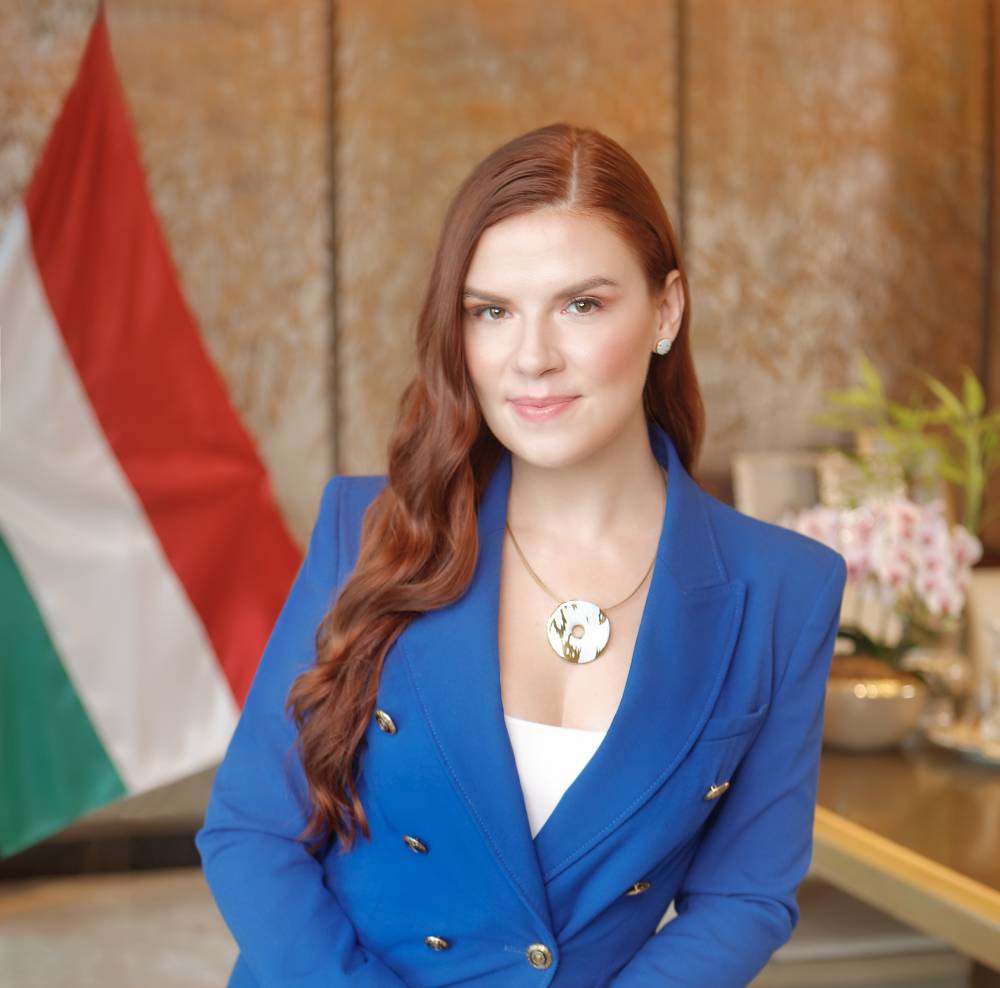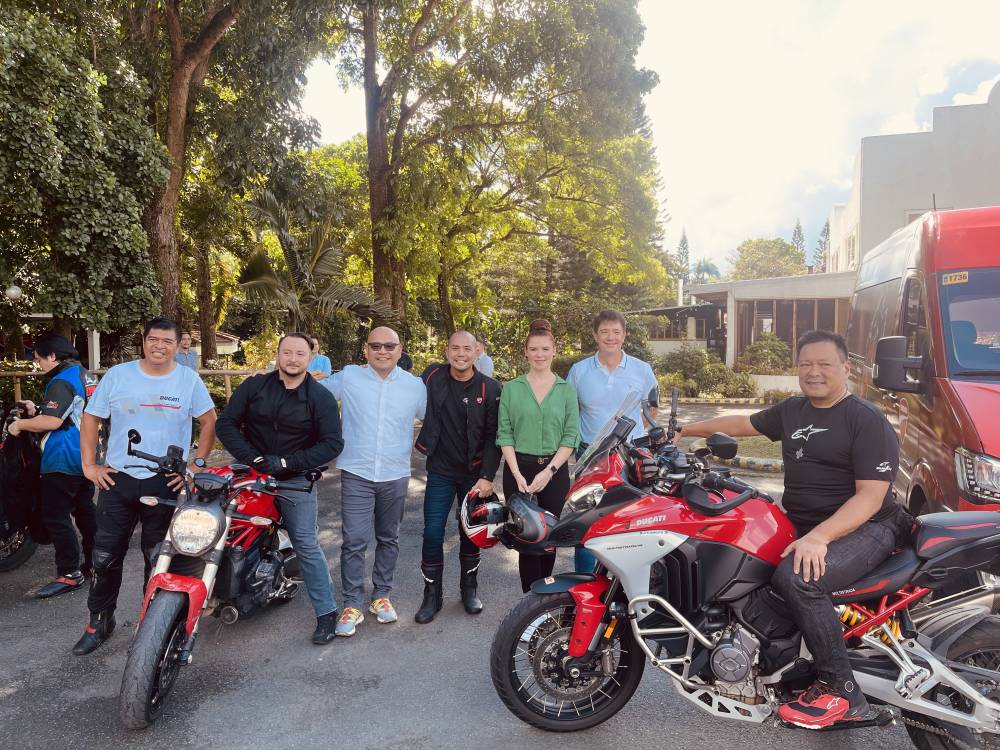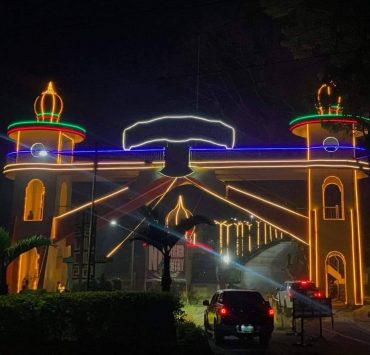A touch of Hungarian diplomacy

Say it with flowers. Hungary’s envoy to the Philippines has mastered this uncomplicated approach to soft-selling her country.
Nearly four years into her tenure, Ambassador Titanilla Tóth’s touch still works just fine. She has come to be known for her style signifier, floral-printed outfits.
The Embassy of Hungary was established in the country in 1973. It has been on a yearlong celebration of the 50th anniversary of bilateral cooperation between the Philippines and Hungary.
In our interview at the embassy residence, we were immediately tantalized by the table setting. The exquisite porcelain dinnerware was embossed with yellow and lavender floral and butterfly patterns in a design that harked back to the 19th century. Produced by Herend, the world’s largest artisanal porcelain factory, the set was a replica of Hungary’s wedding present to British royal couple William and Catherine, now Prince and Princess of Wales.
This writer was then presented with the book, “Hindi Pasisiil ang Pagsibol, at Iba Pang Tula Mula Hungaria (A Blossoming that Will Not be Stifled, and Other Poems of Hungary).” Published last year, the anthology is headlined by Magyar National Poet Sándor Petöfi and translated into several Philippine dialects. On the cover is a single sampaguita bloom superimposed on Hungary’s national colors.
A collaboration between the Embassy and Ateneo de Naga, the anthology invites readers to ponder the metaphors of nature to discover each poem’s subtle message.
The envoy explained that the recurring floral theme between the covers symbolized the friendship between the two countries, a flourishing that shows no sign of slowing down.
Year-long feteAt the anniversary launch, held last Sept. 28, Senate President Juan Miguel Zubiri noted that Hungary was the country’s strongest ally in the European Union. These ties have been strengthened, Tóth added, by frequent high-level visits and regular political and economic consultations.
The launch kicked off a landmark year of celebration. The Embassy started the ball rolling with Hungarikum (The Best of Hungary) Week with a fortnight of social and cultural events at a hotel. These included a reception, high tea, a presentation of the unique Tokaji “noble sweet wines,” and a fashion show that spotlighted evening wear with Hungarian embroidery, handmade porcelain jewelry and Dennis Lustico’s modern Filipiniana. The Grand Kitchen at Grand Hyatt Philippines offered a Hungarian menu, and the food was nearly sold out daily.
Hungary is no longer terra incognita to Filipinos. Tóth observed that applications for tourist visas have risen dramatically in the past year, with Central Europe becoming a popular alternative to Western Europe as a travel destination. The Embassy has created a Travel Tuesday page on Facebook to promote Hungary’s history, cultural events and tourist attractions.
The Philippines is Tóth’s first posting as ambassador. Filipinos are amused when her name is abbreviated as Ambassador Tita, a term for “aunt” (or for socialite of a certain age), when she is only 36.
Quick response
At the start of her tenure in 2020, Tóth presented her formal credentials to President Rodrigo Duterte with well-defined goals in specific areas: risk and disaster management, water technology, agriculture and education. Basis for the emphases was the Philippines’ vulnerability to natural calamities.
Hungary has since donated water treatment units to the Office of Civil Defense and the National Disaster Risk Reduction and Management Council. Tóth recalled that in the aftermath of super typhoon “Rolly” (Goni), which devastated Catanduanes in November 2020, Hungary immediately sent a water treatment system. “In three hours, potable water was available,” she said.
The two countries have embarked on joint food security research programs. A demo farm that cultivates seeds from Hungary has been set up at the University of the Philippines Los Baños.
Hungarian companies, accredited by the Department of Agriculture, are now exporting meat products. “Filipinos experience authentic Hungarian sausages, salamis and foie gras, deepening our culinary bonds,” said Tóth.
Education is clearly close to her heart. Under the Stipendum Hungaricum program, Hungary provides 35 full scholarships for undergraduate to doctorate degrees, or even for medical courses. Tóth said she enjoyed listening to the experiences of the alumni as much as meeting new scholars.
Through the humanitarian aid program Hungary Helps, the Embassy has been quick to respond to crises. Tóth pointed out, “As a matter of course, we take immediate action because it affects people’s lives.”
Last December, Hungary was the first to extend a helping hand to victims of the bombing at the Mindanao State University in Marawi. “Hungary is also a Christian country,” Tóth pointed out. “We try to build stronger relationships with countries that practice the same values.”
In 2021, the Nuestra Señora del Pilar Zaragoza parish church in Sibonga, Cebu, was savaged by super typhoon “Odette.” To preserve the heritage site, Hungary donated funds for the restoration of damaged frescoes.

Down time
At leisure, Tóth and her husband, entrepreneur Arkadiusz Jan Tracz, hie off to Tagaytay, where they enjoy the local comfort food, bulalo soup. In their travels across the country, she has been especially stunned by the diverse aquatic ecosystems and landscape of Coron and the variety of offerings in Bohol, from the children’s choir that performs along the Loboc River, to the endangered tarsiers.
She added, “My husband rides around on his motorbike. He goes on tours with friends from the motorbike community.” In the field of soft diplomacy, spouses can play a role in strengthening cultural ties with the host country.
A Philippines-Hungary friendship ride was organized last year with Sen. Joseph Victor Ejercito, a motorcycle enthusiast, as “rider of honor.” Tracz represented the ambassador on that road trip. When the riders reached Tagaytay, Tóth was waiting to welcome them with breakfast. “These little things add up in diplomacy,” she said.
As more women ambassadors take up posts in the Philippines, their husbands participate in Spouses of Heads of Mission (Shom), an informal organization comprised of spouses of foreign ambassadors assigned to the Philippines. The husbands are active in Shom’s cultural and fund-raising events. At one of Shom’s main activities—the International Bazaar co-organized with the International Bazaar Foundation (IBF)—Tracz represented the diplomatic spouses, along with Pamela Louise Manalo, wife of Foreign Secretary Enrique Manalo and IBF chairperson. He delivered the closing remarks.
At the end the interview, this writer received a pretty little box containing a porcelain rose. Said the stylish and sincere hostess, “This memento will hopefully remind you of a special moment with Hungary, and maybe make you more curious about who we are.”

















